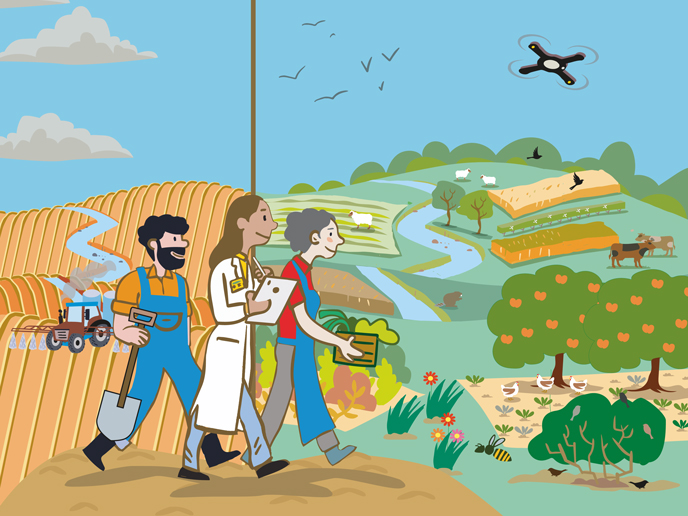Agroecology: Transitioning toward sustainable, climate and ecosystem-friendly farming and food systems
A holistic approach that supports sustainable agricultural production while maintaining robust stewardship of the environment, agroecology works with nature and ecosystem services, increasing the resilience and diversity of farms, and that holds the potential to drive a full transformation of farming and food systems. Agroecology has implications for a span of agricultural practices, from breeds and varieties used, to soil management practices and crop diversification strategies, integration in value chains, and business models that can sustain locally adapted practices and provide greater market opportunities for farmers and consumers. Examples of farming practices implementing agroecological principles are organic farming, agroforestry and mixed farming. Agroecology has the potential to become a fundamental tool for the EU in its effort to promote a sustainable farming sector that respects planetary boundaries and is able to respond to changing needs of society both in terms of sustainable and healthy diets and with regard to the environmental and climate issues related to primary production. Research and innovation in this area is opening up new opportunities in farming systems, making it possible to use ecosystem services to benefit sustainable and resilient land use systems without jeopardising profitability of the farming activity. Agroecology has been identified as a practice that can be supported through the eco-schemes under the first pillar of the Common Agricultural Policy (CAP). It has also been singled out as one of the sustainable farming practices that can help achieve the targets of the EU Green Deal and its related Farm to Fork and Biodiversity strategies. Under Horizon 2020, the EU has funded several research projects dedicated to advancing agroecological research. These projects are contributing to an increased understanding of the practical implementation of ecological and low-input farming practices, along with their environmental, climate and social benefits. These advances will be further boosted in Horizon Europe, under which the Commission has proposed a candidate European partnership on ‘Accelerating farming systems transition: agroecology living labs and research infrastructures’. If successful, the overarching goal of this candidate partnership would be to tap into the potential of agroecology and of local innovation to accelerate the transition towards sustainable, climate- and ecosystem-friendly farming systems in Europe. Beyond informing the definition of upcoming research and innovation actions under Horizon Europe and helping to create synergies between Horizon 2020 projects and the proposed candidate European partnership on agroecology, this CORDIS Results Pack on Agroecology aims to feed into key ongoing processes such as the reform of the CAP, where it can provide useful knowledge for the preparation and evaluation of the CAP Strategic Plans and the design of eco-schemes. Moreover, the EU recently adopted its new Action Plan for the development of organic production, for which research in agroecology will be an important enabler. Ultimately, the Results Pack seeks to mobilise stakeholders to work together to scale up this promising research area by showcasing what has already been achieved by EU-funded research and innovation actions. Projects highlighted in this Results Pack are examples of the broad range of EU-funded research and innovation activities being carried out in this space, and the variety of ways in which agroecology can support sustainable agriculture and environmental protection. DIVERSify, Diverfarming and DiverIMPACTS all show how increasing the diversity of crops grown on farms can provide greater economic and food security, more protection against pests, higher biodiversity and more sustainable production than short rotation cropping and monocultures. Europe’s growing demand for legumes, and the role of legume crops in diversified and ecological farming, are addressed through projects including TRUE, LEGVALUE and Legumes Translated. The need for increased access to organic feed and seed are the focus of the OK-Net EcoFeed and LIVESEED projects. And research carried out within LIFT and UNISECO and by projects funded under the CORE Organic Cofund reveal the different ways in which farmers, industry and policymakers can nurture the growth and development of agroecological farming.



